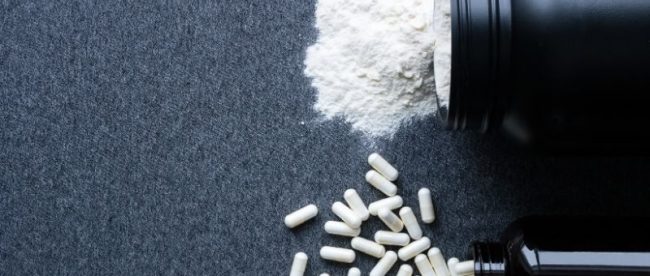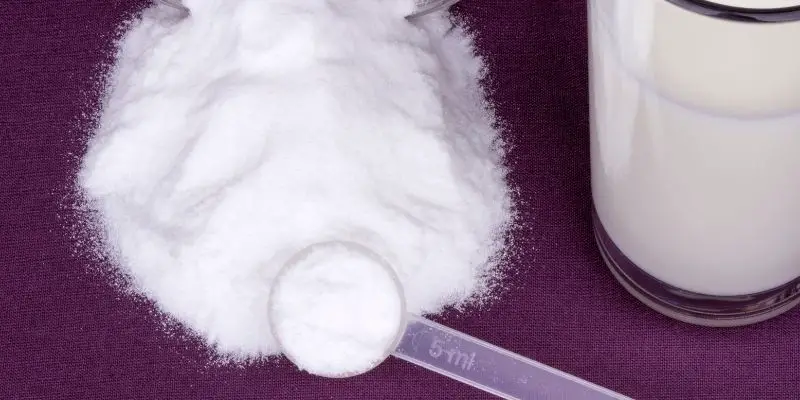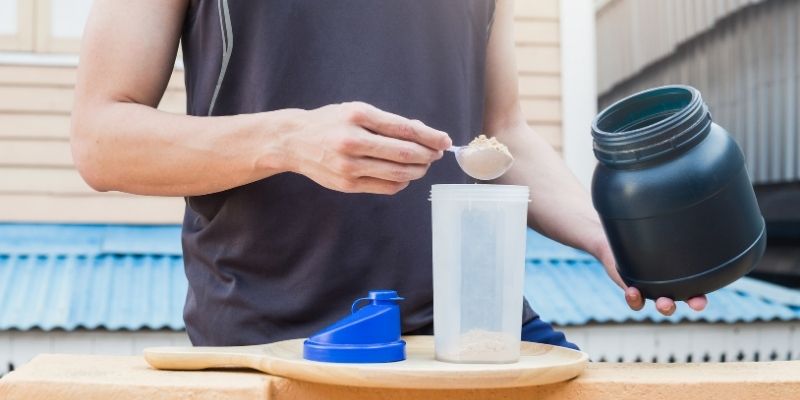Creatine on Keto: Pros, Cons and Best Options to Consider

When it comes to supplements you can take on a ketogenic diet, most people will suggest creatine. What is creatine, and can you have creatine on a keto diet? To find out all the answers on keto and creatine, I’ve done some in-depth research. In this article, I will present to you all the answers you need concerning keto creatine.
Do you have a particular question about creatine on keto? Then use the table of contents below to jump to the most relevant section. And you can always go back by clicking on the arrow in the right bottom corner of the page. Also, please note that some of the links in this article may be affiliate links. For more details, check the Disclosure section at the bottom of the page.
Does creatine has carbs, and what is it?

Creatine is a natural substance that gets converted to creatine phosphate in the body. Creatine phosphate then aids in the production of ATP, or adenosine triphosphate. ATP is a molecule that carries energy in the cells of all living things. ATP provides energy for muscle contractions. This makes it a popular ingredient in dietary supplements to increase physical performance.
Creatine can be found in performance or sports supplements. It is consumed because it improves strength, speeds muscle growth, and reduces fatigue and tiredness. Creatine works by providing a steady supply of available energy for high-intensity training.
By the way, our bodies do produce creatine in tiny amounts. Creatine is also found in small quantities in fish and red meat. However, creatine in the form of supplements is more comfortable to use if you want to make sure you get enough.
That begs the question…
Can you have creatine on a low carb diet like keto?
Creatine doesn’t have any carbs in it. You can take forms of creatine like creatine monohydrate on keto. You don’t have to worry about getting kicked out of keto after eating creatine supplements. Creatine is a popular supplement on the ketogenic because it is well researched, effective, and safe.

Taking creatine supplement: pros and cons

Creatine supplements have a lot of benefits to taking them. Even though they are very popular in athletes and gym rats, they also have other benefits to body health. Let’s take a look at them below.
Pros of taking creatine supplements
- Taking creatine while on keto may be a buffer for that loss of energy a new keto dieter may face when starting the diet. This is because creatine produces extra energy that is needed in muscle contractions.
- Creatine also helps to increase strength and build muscle. This is one of the most popular uses for creatine – to be used by athletes and gym-goers. It allows them to perform better and for longer times.
- Besides the benefits to physical performance, creatine is also essential for dealing with mental health issues such as depression. The research shows that disruption in brain energy can lead to depression. Since creatine is a safe and cheap nutritional supplement for energy, it can help with depression.
- Creatine may lower blood sugar levels, and this can be used in fighting diabetes. Studies showed that people who combined creatine consumption with exercise had better blood sugar control than those who only exercised.
- Creatine may also fight neurological diseases such as Parkinson’s disease, Alzheimer’s, ischemic strokes, epilepsy, and brain or spinal cord injuries.
Cons of taking creatine supplements
- Creatine may make asthma symptoms worse. However, keep in mind that asthma can be set off by aerobic exercise anyway, so such a person should take extra precautions.
- Creatine increases levels of DHT in the body. DHT is a compound that may cause hair loss in some people. Research is limited in this area, so it must be taken with a grain of salt.
- The effects of taking creatine may be diluted by high levels of caffeine being consumed by the body. In such cases, it is better to take creatine and coffee at different times, for example, alternating coffee and creatine before or after training.
- In addition to the above, there is another issue: Creatine may not work on some people. These are people who already have significant creatine levels in their bodies, so extra creatine won’t affect them anyway.

Are you stuck on keto? The between success and failure on this diet is lack of planning! And this plan has guided over 416,387 people to their dream weight goal. Will it work for you? Grab it here.
Does creatine powder have carbs?
There are 0 grams of carbs in creatine powder. That means that creatine is keto-friendly. However, you need to be extra careful before buying a creatine powder supplement. Read the ingredients list very carefully because some creatine supplements will have added sugars and flavors to them. Buy the creatine powder that has only pure creatine listed under the ingredients.
That said, make sure to mix creatine powder in substances that are keto-friendly, like cold water. Avoid mixing creatine with fruit juice, because as we all know, fruit juice will kick you out of ketosis.

Can you take creatine while on keto diet?

Yes, you can take creatine while on the keto diet. In fact, it is a good idea to add creatine to your keto routine. Creatine is an effective and safe nutritional supplement that boosts energy. When you first start on the keto diet, you may feel a temporary dip in energy (and also the dreaded keto flu.) By incorporating creatine into keto, you have a safe source of energy.
But that doesn’t mean you should stop taking creatine on keto after the first few days – you can keep having creatine on the ketogenic diet. It has various benefits for increasing strength, building muscles, and reducing blood sugar levels.
You can consume creatine without carbs to mess up your ketosis.

Benefits of creatine on keto
Like MCT oil, creatine is an excellent nutritional supplement to add to your routine while on the ketogenic diet. So, how exactly does creatine help on keto? Let’s find out in detail below.
Creatine can help with intense workouts while on the ketogenic diet. Intense workouts deplete the blood glucose in your body. That means your body will turn to its glycogen stores for energy. Glycogen is the form in which glucose is stored in muscles.
When you are exercising or fasting, the glycogen in muscles is converted to glucose, a source of energy.
There is a scarcity of glucose in the body on a ketogenic diet due to its low carb diet. That’s where creatine enters the picture.
Since you can’t have many carbs on keto, creatine provides that extra energy you need to meet intense exercising needs. Although, if you are doing the right keto you should have a good balance of all the macros (and in case you think your keto diet is not fully balanced and doesn’t bring the enhanced levels of focus and energy you might need to personalize your nutrition and find more fitting menu. More about it here.


How much creatine to take on keto?
Take 5g of creatine per day, every day. Read the instructions on the bottle of your creatine supplement. Also, be sure to consult your medical practitioner before starting any supplement. That said, creatine is perfectly safe and doesn’t have any crazy side effects from over-dozing. Taking too much creatine is just a waste.

When to take creatine on a keto diet?
Taking creatine supplements on keto is a great idea. A carb-restrictive diet like the ketogenic diet calls for some extra energy when you are doing intensive exercise. You can take your creatine supplement on keto right before you start your day to boost your physical performance. You can also take creatine after a heavy workout session to replace lost energy. Or, you can alternate taking half of the low carb creatine before a workout and half after.

Best creatine for muscle gain and fat loss
When it comes to creatine supplements, be ready for some strength increase and muscle building. Using creatine on keto will ensure that you will replace any lost energy quickly. Let’s take a look at some of the best creatine for muscle gain and fat loss, all the while maintaining a ketogenic diet. After spending hours of researching the best options for the cause I found that the following two would most likely be the best fit.
supplement contains creatine monohydrate and creatine hydrochlorate. Those are the best creatine forms, IMHO. It will build muscle and provide more energy to your day. The glutamine will ensure the replacement of lost energy, so say goodbye to post-workout soreness and stiffness.
Another option is ProMix creatine. It helps you to train harder and for more extended periods. It provides energy to replace any that was lost during physical activity. The super-fine consistency makes sure you can mix it up with anything. It will stay mixed without having to continuously shake it. This creatine supplement doesn’t cause bloating, which can be a side effect of using creatine supplements.
Thanks for the graphics: Canva.com
Disclosure: At vegketodiet.com I only mention the products that I researched and considered worthy. But it’s important to note that we are a participant of several affiliate programs, including but not limited to VigLink and Amazon Services LLC Associates Program. As an Amazon Associate, this website earns from qualifying purchases. Also please note that I am not a doctor. As such readers are strongly recommended to make decisions that might affect their health by doing their own research. At vegketodiet.com I only document and describe thoughts, researches and ideas that proved to be working for me.

